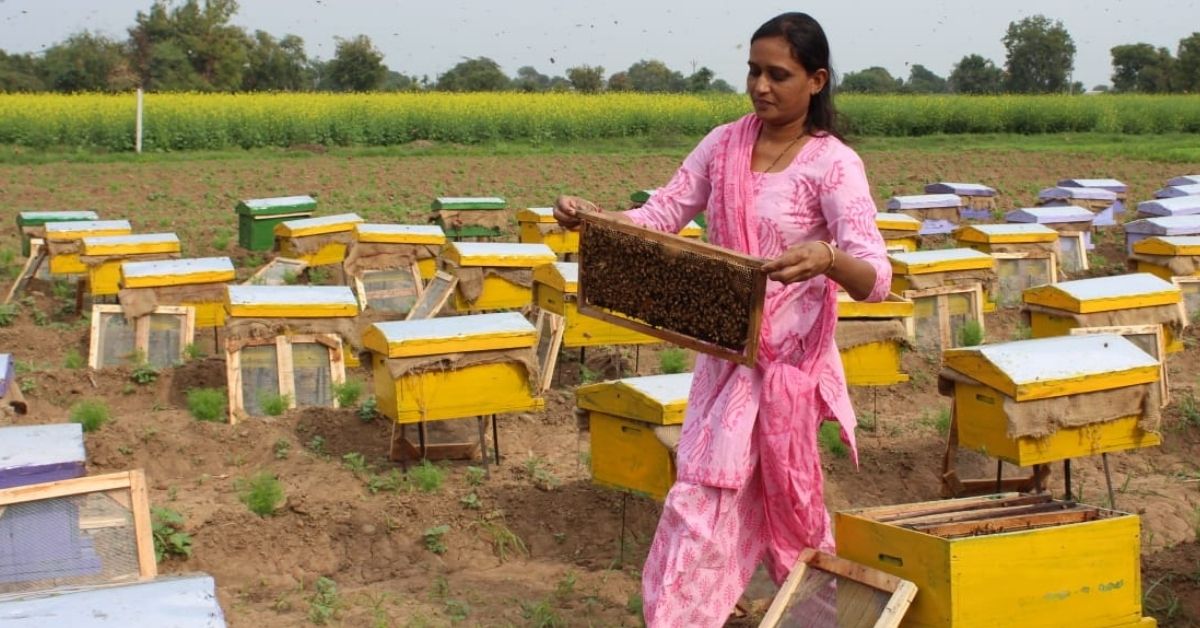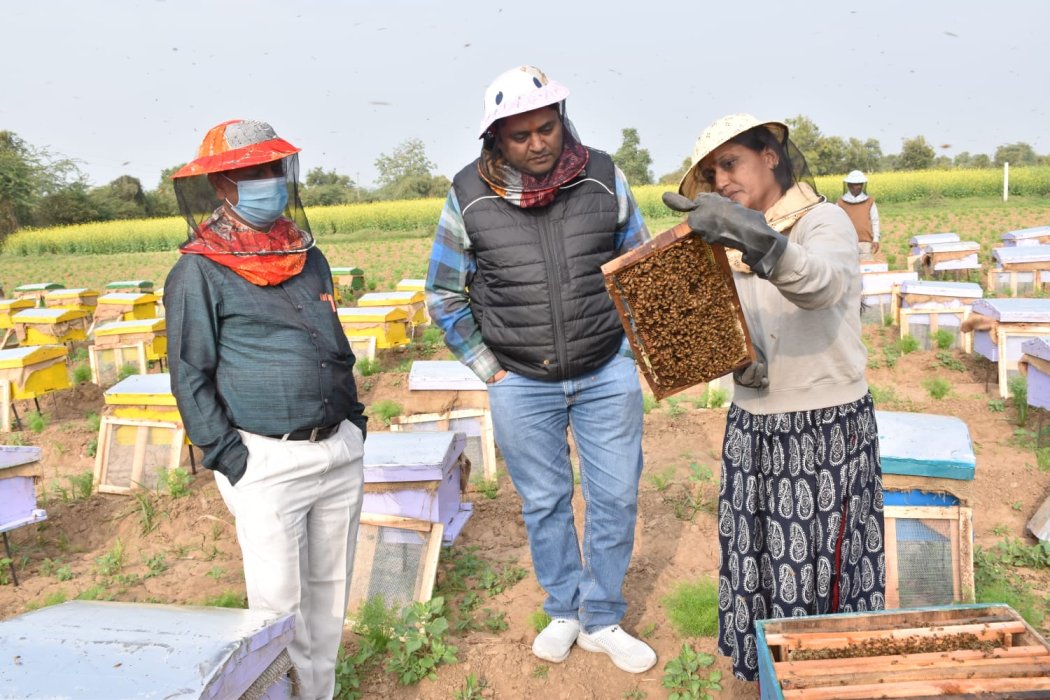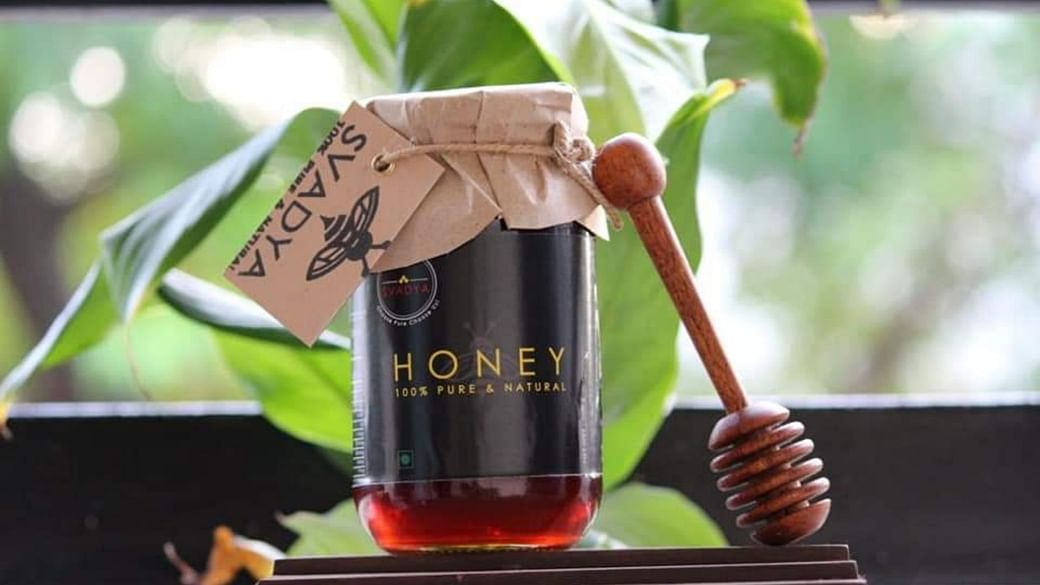Beekeeping In Recycled Crates, Couple Earns Rs 12 Lakh Selling Organic Honey
Gujarat-based couple Himanshu and Tanvi Patel run Svadya, which sells organic and raw honey, for which they practice beekeeping. This also serves as an alternative to the use of chemicals on their farm.

Gujarat-based couple Tanvi and Himanshu Patel belong to the growing population of people who are willingly quitting their corporate jobs for organic farming.
They left their jobs when they realised that their agricultural land was laden with chemicals by the farmer who had leased it. At the time, Himanshu, a mechanical engineer, was working as a senior manager at the JSW power plant. Tanvi was a school teacher.
In 2019, the duo began their organic farming journey. While looking for alternatives to harmful pesticides, beekeeping popped up during one of their internet searches.
“If the crops and vegetables receive enough pollination, the growth can be faster. We first experimented on our own and then got training in beekeeping from the Krishi Vigyan Kendra (KVK),” Tanvi tells The Better India.

This knowledge has been incorporated into their homegrown honey brand Svadya, which today has a presence across the country. They began with just one or two wooden crates of honey, gradually increasing to 100, and then 500.
The duo shares how they not only developed their venture of selling raw honey, but also helped farmers from the neighbouring farm shift to organic cultivation.
The set up
Bees can die instantly if they inhale chemicals within a radius of 3-4 kilometres. When the ones in Tanvi and Himanshu’s experimental crates died after inhaling chemicals from the neighbouring farm, the couple lost close to Rs 3,60,000, they say.
So by the next season — between October and April — they migrated the boxes to the other end of the farm. They requested the neighbouring farmer to give up chemical farming on 3 bighas (1 bigha is 0.275 acre) of his land.
They purchased beehives from beekeepers, and in each wooden crate, harvested eight beehives, which contained a total of 30,000 bees.
“We purchased beehives for Rs 4,000 during the season, otherwise it can cost up to Rs 17,000. We got the crates from KVK and began harvesting the bees, which can take up to 12 days. The maintenance per year costs around Rs 1,50,000, including their food, labour charges and migration charges if the position is to be changed,” says Himanshu.
The duo has to dedicate two hours daily to maintain the boxes, and on the day of harvest, it takes them upto 12 hours to attend all the boxes. “We transfer the honeycomb in an empty box and remove the honey from the surface. We use a honey extractor machine to do this without harming the eggs. While removing, we wear all the safety gear and stay calm throughout the process, so as to not scare the bees. The maintenance is not much, but in the off-season, we have to give them sugar syrup, fruit juices and jaggery water to maintain their health,” explains Tanvi.

Tanvi and Himanshu say they do not process the honey, and package it raw under their FSSAI-certified brand. They sell around 300 kilos of honey every month, and get an average profit of Rs 9 lakh to Rs 12 lakh.
When asked what marketing strategies the duo adopted to get orders from across India, Tanvi says it was all word of mouth. Several of Himanshu’s former colleagues at the JSW plant in Barmer, Rajasthan, purchased the honey and shared it with their relatives. The duo also used social media to spread the word.
Their total farm production increased by 1.5 times, thanks to pollination, the duo says. Seeing this, neighbouring farmers also borrowed the crates for the same.
“I borrowed three crates from Tanvi for my last cycle of fennel cultivation on my 3 bigha land. My production increased by 50% and I did not use any chemicals or pesticides. It was completely organic. I was pleasantly surprised to see the impact of beehives on my farm. I hope to get beehives of my own soon,” Pakaji Thakor, Tanvi’s neighbouring farmer, says.
You can connect with Svadya here.
Edited by Divya Sethu
This story made me
- 97
- 121
- 89
- 167
Tell Us More
We bring stories straight from the heart of India, to inspire millions and create a wave of impact. Our positive movement is growing bigger everyday, and we would love for you to join it.
Please contribute whatever you can, every little penny helps our team in bringing you more stories that support dreams and spread hope.



















